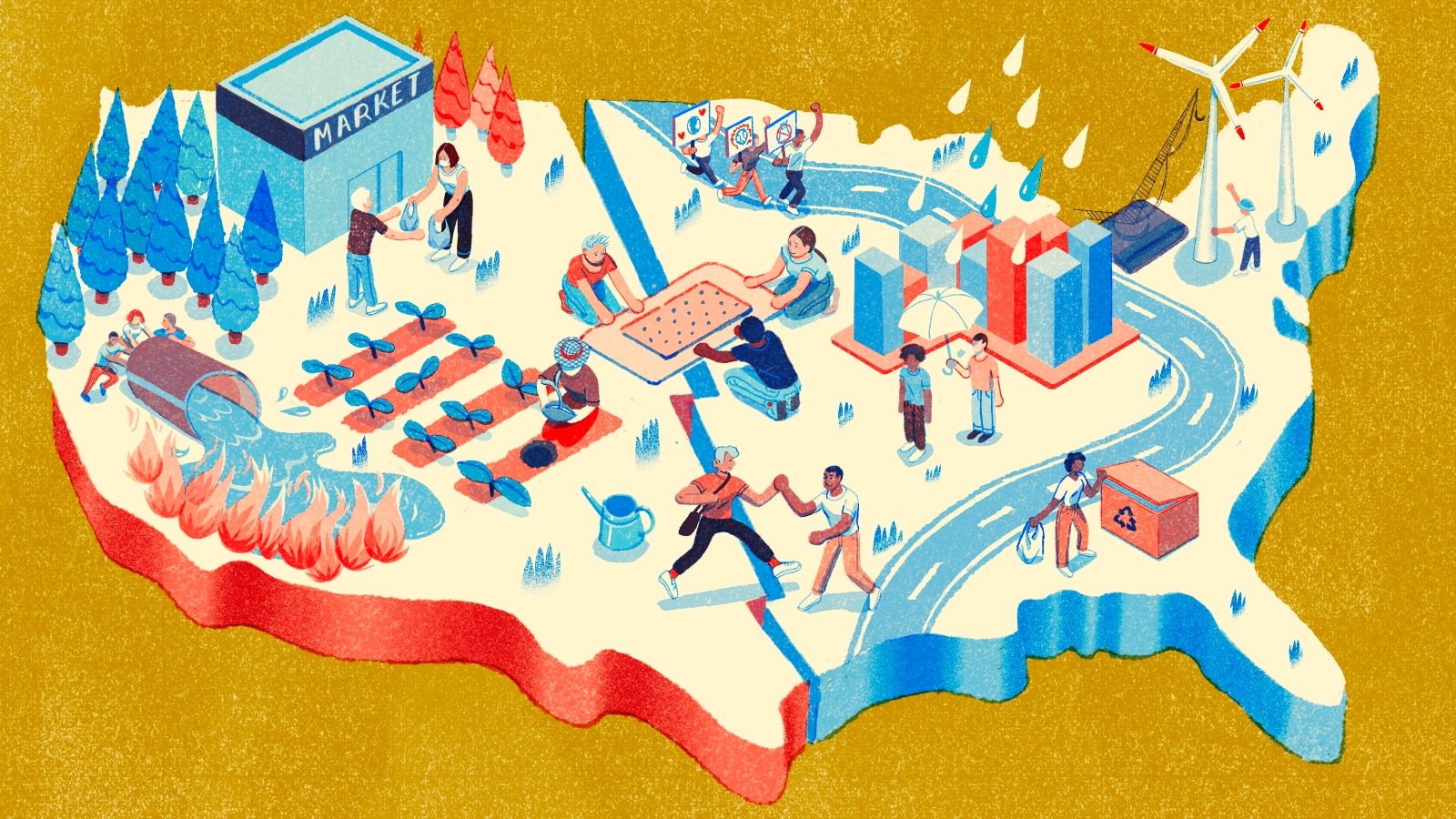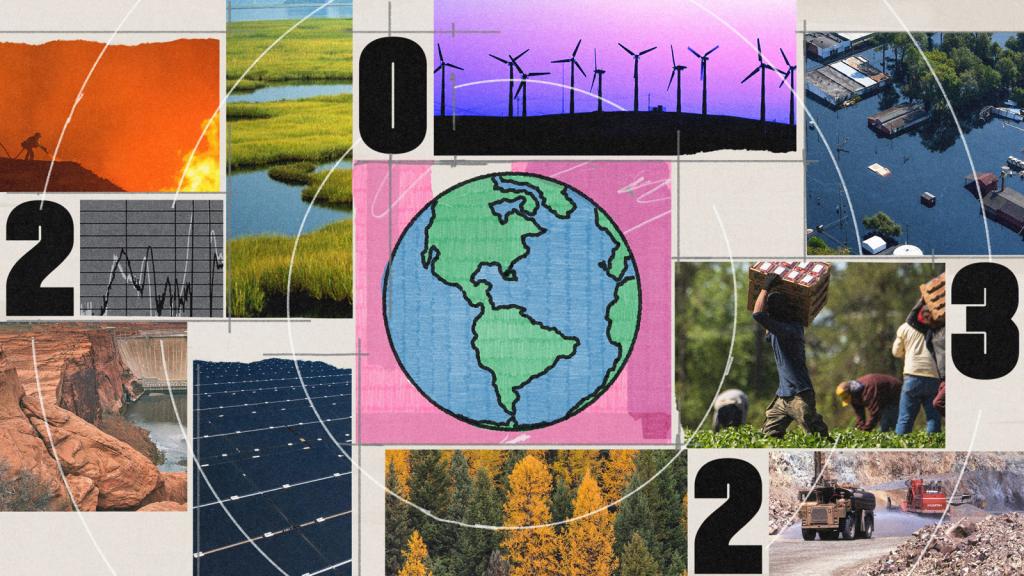The 2020 election is finally over. But the hard work of building a better, cleaner, more just future has only begun.
Although Joe Biden won the presidency with 50.8 percent of the popular vote, he will lead a deeply divided nation. Donald Trump lost, but Trumpism retains its grip on the Republican party, and undoing his administration’s environmental rollbacks and other policies will take time. Biden faces another potential hurdle: Two key Senate races won’t be decided until January, leaving control of the Senate in doubt. A divided Congress would make enacting any agenda difficult, if not impossible.
That’s not to say Biden doesn’t have powerful tools he can use immediately to begin mitigating the worst effects of climate change. They include signing executive orders, appointing trusted climate leaders to key positions, and making it clear that addressing this existential threat remains his top priority. Meanwhile, grassroots campaigns for environmental and social justice carry on. Climate activists (not to mention world leaders) are heartened by Biden’s win — but they will remain just as dogged in pushing for decisive climate action and holding his administration accountable.
Fix reached out to five such organizers to hear their election reflections, and where they will turn their attention next. Varshini Prakash is the cofounder and executive director of the Sunrise Movement, a youth-led political advocacy organization. Audrey Lee is a clean-energy wonk and a co-chair of the group Clean Energy for Biden. Adrien Salazar is a senior campaign strategist for climate equity at the think tank Demos. Rialin Flores is the executive director of Conservation Voters for Idaho. And Nathaniel Stinnett is the founder and CEO of the Environmental Voter Project, a group focused on turning out voters who care about environmental issues.
Their remarks have been edited for length and clarity.
Q. What’s the most strategic thing Biden could do for the climate in his first 100 days in office?
 Prakash: With record-setting climate disasters and a historic recession devastating the country, we need Joe Biden to deliver on his promise to Build Back Better, in a way that puts working people and climate action at its core. Regardless of what the Senate looks like, Biden can use the full power of the executive branch to make massive changes to address climate change starting commandingly on day one.
Prakash: With record-setting climate disasters and a historic recession devastating the country, we need Joe Biden to deliver on his promise to Build Back Better, in a way that puts working people and climate action at its core. Regardless of what the Senate looks like, Biden can use the full power of the executive branch to make massive changes to address climate change starting commandingly on day one.
The first and most important thing he could do now to show he’s serious about using every tool in the executive toolbox would be to create a new position to lead an Office of Climate Mobilization. This position would report directly to the president to lead an all-government effort at mobilizing to address this crisis — just like we mobilized to address the existential threat of Nazi Germany in World War II.
 Salazar: I think the first thing Biden can do to signal his commitment to taking the climate crisis seriously is to revoke key permits to stop the Keystone XL, Dakota Access, and Line 3 pipelines. This will communicate that he understands the urgency of the crisis, particularly for communities at the frontlines of extraction and pollution. It will also demonstrate he is ready to leave behind climate incrementalism and willing to accelerate a national mobilization to confront the climate crisis and secure a livable future for all.
Salazar: I think the first thing Biden can do to signal his commitment to taking the climate crisis seriously is to revoke key permits to stop the Keystone XL, Dakota Access, and Line 3 pipelines. This will communicate that he understands the urgency of the crisis, particularly for communities at the frontlines of extraction and pollution. It will also demonstrate he is ready to leave behind climate incrementalism and willing to accelerate a national mobilization to confront the climate crisis and secure a livable future for all.
 Stinnett: Executive orders are the easiest way to take quick action. On day one, I’d like to see the Biden administration declare the climate crisis a significant national security threat, and based on that issue an executive order placing climate tariffs on carbon-intensive products and all imports from countries that don’t meet the Paris Agreement emissions standards. We’d get a carbon border tax on January 20 without having to go through Congress.
Stinnett: Executive orders are the easiest way to take quick action. On day one, I’d like to see the Biden administration declare the climate crisis a significant national security threat, and based on that issue an executive order placing climate tariffs on carbon-intensive products and all imports from countries that don’t meet the Paris Agreement emissions standards. We’d get a carbon border tax on January 20 without having to go through Congress.
Q. Based on the popular vote tallies, our country remains deeply (in fact, about evenly) divided. What does that mean for the work ahead, in terms of driving action on climate and justice?
 Salazar: Despite the fact that many people voted for Donald Trump, most Americans want to see the government act to confront the climate crisis. This is true across racial groups, with people of color often more in favor of urgent climate action than their white counterparts. Climate chaos is the lived reality of millions, and now a Biden administration must mobilize with the expediency of a national emergency.
Salazar: Despite the fact that many people voted for Donald Trump, most Americans want to see the government act to confront the climate crisis. This is true across racial groups, with people of color often more in favor of urgent climate action than their white counterparts. Climate chaos is the lived reality of millions, and now a Biden administration must mobilize with the expediency of a national emergency.
 Lee: I echo what Joe Biden has said: “It will be time for us to put the harsh rhetoric of the campaign behind us, to unite, and to heal.” We still have work ahead of us to convince Americans that climate change and clean energy are an opportunity to transition and grow our economy.
Lee: I echo what Joe Biden has said: “It will be time for us to put the harsh rhetoric of the campaign behind us, to unite, and to heal.” We still have work ahead of us to convince Americans that climate change and clean energy are an opportunity to transition and grow our economy.
I started my career in the Bush administration in 2005 at the Department of Energy. I went into the job telling myself that, as a public servant, I work for the American people and the American people elected President Bush. And during my five years there, I always did my best for the country, modeling energy-policy scenarios so that the administration had the best information to make policy for the America that elected it. Climate change should not be a partisan and political issue, and I think we need to continue to work on that.
 Flores: Just last week here in Idaho, Blaine County not only advanced a clean-energy commitment, but a commitment to electrification of their fleet. And they’ll be bringing in stakeholders to hold the county accountable and advance that commitment into the future. The small, rural town of Hailey made a clean-energy commitment as well. I know the national dialogue definitely highlights a deep political division, but we’re advancing climate policy here locally by connecting with people on the issue and recognizing the impact on our communities and on our future. We’re finding leaders across the political spectrum — conservative, progressive — to work together to define how we make those commitments and step forward.
Flores: Just last week here in Idaho, Blaine County not only advanced a clean-energy commitment, but a commitment to electrification of their fleet. And they’ll be bringing in stakeholders to hold the county accountable and advance that commitment into the future. The small, rural town of Hailey made a clean-energy commitment as well. I know the national dialogue definitely highlights a deep political division, but we’re advancing climate policy here locally by connecting with people on the issue and recognizing the impact on our communities and on our future. We’re finding leaders across the political spectrum — conservative, progressive — to work together to define how we make those commitments and step forward.
Q. From your vantage point, what impact did climate have on this election cycle?
 Prakash: Four years ago, climate change didn’t play a role in the presidential election. There wasn’t even a question asked at the debates. Even in 2018, Democrats publicly downplayed the issue, saying it wouldn’t be a priority until 2021. Biden has embraced climate change, declared it his “number one issue,” leaned into it as a major part of his platform and the closing strategy of the campaign, and put forward the most ambitious plan we’ve ever seen from a major party candidate. This was a climate election.
Prakash: Four years ago, climate change didn’t play a role in the presidential election. There wasn’t even a question asked at the debates. Even in 2018, Democrats publicly downplayed the issue, saying it wouldn’t be a priority until 2021. Biden has embraced climate change, declared it his “number one issue,” leaned into it as a major part of his platform and the closing strategy of the campaign, and put forward the most ambitious plan we’ve ever seen from a major party candidate. This was a climate election.
 Salazar: During the final stretch of the national election, we saw wildfires ravaging the West and turning skies orange, and multiple hurricanes battering the Gulf Coast in the South. Millions of people’s lives were thrown into chaos by the climate crisis. This, along with the persistent organizing of activists and young people to ensure candidates did not side-step the crisis, turned climate change into a point of national debate.
Salazar: During the final stretch of the national election, we saw wildfires ravaging the West and turning skies orange, and multiple hurricanes battering the Gulf Coast in the South. Millions of people’s lives were thrown into chaos by the climate crisis. This, along with the persistent organizing of activists and young people to ensure candidates did not side-step the crisis, turned climate change into a point of national debate.
 Lee: I’ve worked in clean energy for more than 15 years, and it’s gratifying for me to finally see this issue become mainstream. New York Times’ exit polls showed that, for 68 percent of Biden voters, climate change is a serious problem. Clean Energy for Biden is a testament to that growing recognition.
Lee: I’ve worked in clean energy for more than 15 years, and it’s gratifying for me to finally see this issue become mainstream. New York Times’ exit polls showed that, for 68 percent of Biden voters, climate change is a serious problem. Clean Energy for Biden is a testament to that growing recognition.
 Stinnett: It’s abundantly clear from early voting data that first-time voters who care deeply about climate change turned out in huge numbers. In the 12 states where the Environmental Voter Project works, we saw 33 percent turnout from these first-time environmental voters from early voting alone. (In other words, up until this fall, these environmentalists had a zero percent voting rate, but they had a 33 percent turnout rate by the end of early voting.) To be sure, some of these voters are so young they simply couldn’t vote in previous elections — but even so, this remains a huge turnout rate for first-time voters. This data alone shows that climate voters are now a political force.
Stinnett: It’s abundantly clear from early voting data that first-time voters who care deeply about climate change turned out in huge numbers. In the 12 states where the Environmental Voter Project works, we saw 33 percent turnout from these first-time environmental voters from early voting alone. (In other words, up until this fall, these environmentalists had a zero percent voting rate, but they had a 33 percent turnout rate by the end of early voting.) To be sure, some of these voters are so young they simply couldn’t vote in previous elections — but even so, this remains a huge turnout rate for first-time voters. This data alone shows that climate voters are now a political force.
Q. Where does your attention shift now? What’s next?
 Prakash: We have launched our recommendations for a climate cabinet, and we’ll be doing everything we can to get key leaders into important positions. Climate action under a Biden administration begins with personnel appointments. Under Trump, fossil fuel executives ran Washington. That has to end. Biden should make a clean break by appointing a cabinet free of all fossil fuel money ties and corporate lobbyists — a cabinet that also reflects the racial and economic diversity of America.
Prakash: We have launched our recommendations for a climate cabinet, and we’ll be doing everything we can to get key leaders into important positions. Climate action under a Biden administration begins with personnel appointments. Under Trump, fossil fuel executives ran Washington. That has to end. Biden should make a clean break by appointing a cabinet free of all fossil fuel money ties and corporate lobbyists — a cabinet that also reflects the racial and economic diversity of America.
 Salazar: Climate policy experts, scientists, and activists must push Biden to make sure he not only fulfills his promises but goes beyond them. What he has promised is a start, but it’s insufficient to end the climate chaos brought about by fossil fuel racism. Everything the Biden administration does, from an economic recovery to infrastructure investments, needs to get at the root of the entwined crises of climate chaos and racial and economic inequality. He must commit to making climate justice real, from day one of his presidency.
Salazar: Climate policy experts, scientists, and activists must push Biden to make sure he not only fulfills his promises but goes beyond them. What he has promised is a start, but it’s insufficient to end the climate chaos brought about by fossil fuel racism. Everything the Biden administration does, from an economic recovery to infrastructure investments, needs to get at the root of the entwined crises of climate chaos and racial and economic inequality. He must commit to making climate justice real, from day one of his presidency.
 Flores: For my daughter, I am happy to see what is possible under a new federal administration when it comes to climate action. For us [at Conservation Voters for Idaho], the work that we build here on the ground has to be resilient outside of the swing of what happens at the federal level.
Flores: For my daughter, I am happy to see what is possible under a new federal administration when it comes to climate action. For us [at Conservation Voters for Idaho], the work that we build here on the ground has to be resilient outside of the swing of what happens at the federal level.
We’re supporting communities to better understand what climate action really means to them. We’re particularly thinking about the impacts of COVID right now, and the investments that should be made to not only rebound from it, but also make our communities more resilient to the future. Climate action is a part of that resiliency.
 Stinnett: The Environmental Voter Project is ready to hit the ground running in Georgia for the U.S. Senate runoff elections. We’ve individually identified over 300,000 environmentalists who are unlikely to vote in the January 5 runoffs, and we’re gearing up to text, call, mail, and send digital ads to these environmentalists. It’s always Election Day for us somewhere.
Stinnett: The Environmental Voter Project is ready to hit the ground running in Georgia for the U.S. Senate runoff elections. We’ve individually identified over 300,000 environmentalists who are unlikely to vote in the January 5 runoffs, and we’re gearing up to text, call, mail, and send digital ads to these environmentalists. It’s always Election Day for us somewhere.



